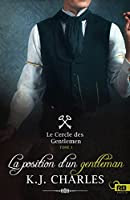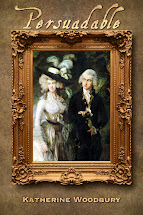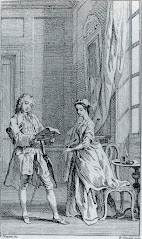Pamela by Samuel Richardson contains a great passive heroine/narrator.
Even at
the time of publication, critics argued that Richardson's heroine was too passive. Why didn't she simply remove herself from Mr. B's house? (The critics weren't
upset about her staying for feminist reasons; they were upset because
Pamela didn't behave like a "good" servant.)
However, what even critics like Fielding
failed to appreciate was how limited Pamela's options truly were. In the
eighteenth century, female servants were supposed to be servile and
impoverished or sluts (and impoverished).
Pamela doesn't want to be
servile, impoverished, or a slut. Her constant calculation of expenses
and belongings isn't manipulative; it is about survival. After all, this is the age of
no credit cards, and no welfare where debts
could land a person in jail.
But the thing that makes Pamela great is not the heroine's lack of options. Her lack of options is a given. What makes Pamela great is the heroine's wit and willingness to defend what she perceives as her core personality.

One of the difficulties with the book Pamela is how much of the wit is
lost in the lecturing. But Richardson was a truly masterful writer.
However much he loves to preach, he can't keep Pamela's character from
creeping through--and what creeps through is consistent. Behind all the
verbiage is a powerful voice that will not be shut up, NOT because
Pamela is particularly aggressive (although she is far more assertive
than she paints herself) but because her voice comes across as genuine
and presents an intelligent, interesting, and passionately held
point-of-view.
The genuineness of the voice, to me, is what makes the difference
between good passive heroine fiction and bad passive heroine fiction. It
isn't about a heroine who tells people off (which too many romance writers,
unfortunately, assume). It's about letting the reader into the heroine's
head, letting the heroine speak, letting us see her internal conflicts.
And if she is witty about it--all the better.
I am discussing Pamela in part because modern so-called well-rounded and edgy heroines often strike me as rather dull. They evince no more control over the world than Pamela BUT they say all the right things. They react in the ways we expect. Take away the onslaught of this-happened-then-this-then-this, and there's no personality there.
Below is a list of well-written novels where the heroine is unable to control her circumstances due to conditions and/or personality (i.e. for part of the book, she is a victim), yet she manages to endear herself to the reader and make a life for herself because she has substance:
- Celine by Brock Cole
- Jane Eyre by Charlotte Bronte
- Persuasion by Jane Austen
- Wyrms by Orson Scott Card
- Little Princess by Frances Hodgson Burnett
- Beauty by Robin McKinley
- Deerskin by Robin McKinley
- Book of a Thousand Days by Shannon Hale
- My Happy Marriage by Akumi Agitogi
















































